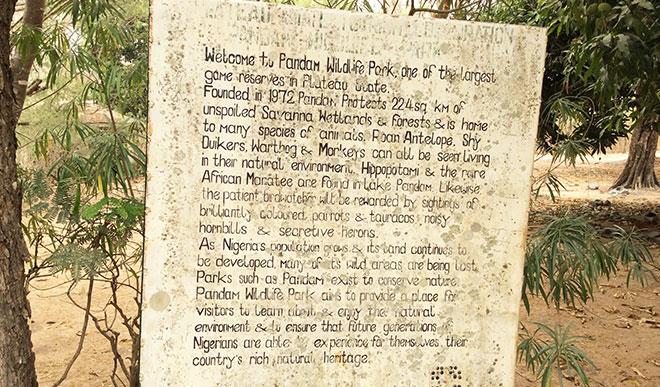
Pandam Game Reserve and Wildlife Park in Plateau State is home to some rare animals and exotic birds. A natural animal habitat that has drawn tourists and researchers from foreign countries, it now faces years of neglect.
The over three hours journey from Jos, the Plateau State capital, to Pandam Game Reserve at the southern senatorial district of the state, held more excitement than seeing the sorry state of one of Plateau’s abandoned natural tourist destinations. Obviously suffering from years of neglect, a part of the game reserve has been converted into a park called the Pandam Wildlife Park and is documented to be Plateau’s largest forest area parked with animals and protects 224sq km of unspoiled savannah wetlands and forest. Authorities say it is also home to many species of animals living in their natural habitat such as the roan antelope, shy duikers, warthogs and a variety of birds and monkeys, while the hippopotamus and the rare African manatee are said to be found in the PandamLake.
Established in 1972 and located in a small community called Pandam in Qua’an Pan local government area, the game reserve is situated beside the Lafia-ShandamRoad to the north of the Benue river and is barely a distance of 60 kilometres to Lafia, the capital of Nasarawa State.
Veering off the road towards the reserve, the deploring state of the tourist village, which is supposedly chalets to accommodate tourists, hidden among towering trees, is the first thing any visitors stares at. To the right is the multipurpose hall, still standing strong but obviously in need of a desperate make over. Two rusty iron boards welcome visitors with a message that reads, “Pandam Wildlife Park aims to provide a place for visitors to learn about and enjoy the natural environment, and to ensure that future generations of Nigerians are able to experience for themselves their country’s rich natural heritage.” The message goes further to mention the various species of animals that can be found in the park and gives a vivid description of the park’s activities and a map that outlines self-guided trails.
It is obvious that those who established the park had something better in mind than the present humiliating structures which greet visitors. Until the 2015 budget of immediate past governor Jonah David Jang, the now Senator had not given much attention to the tourism sector in Plateau State. Past administrations had neglected Plateau’s tourism potentials and based their reasons on the crises situation that had bedevilled the state in the last decade. Jang however in 2015 allocated to Plateau State Tourism Corporation the sum of N1, 283b for the expansion and rehabilitation of 20 chalets, multipurpose hall and manager’s house at the Pandam tourist village and the Jos Wildlife Park.
However, sources at the Ministry of Tourism say the money was never released. Jang’s successor, Governor Simon Lalong’s 2016 budget presently estimates N802 million for the rehabilitation of certain tourist attractions including the Pandam tourist village. But whether or not Pandam will receive any attention this time is left to be seen.
Despite the deplorable state of the place, the General Manager of Plateau State Tourism Corporation, John Doy, says it has attracted foreigners for study. “There was a German who traced a bird toPandam and got his PhD, as well as British students from voluntary service (VOS) who were attached with us for almost a year or two.They carried out researches on birds in the park with students from the University of Jos,” he said
Doy explained that tourism was not only for pleasure but adventure. “There are people who go there because of the rawness of the place. Adventure taking has to do with risk, they even camp there in the forest and spend the night because there are certain sounds of birds that you may say is noisy but some people need to track,” he explained.
However, poor structure and unavailability of manpower are not all the challenges facing Pandam Reserve. News from neighbouring Namu and Pandam communities in Qua’an Pan is that the game reserve was in need of rescue as the Plateau State government has granted lumbering permit to a Chinese company to harvest wetland resources.
Residents of the communities say the state government, in dire need of funds, is resorting to the sale of timber to the Chinese to generate funds rather than develop and make the reserve functional for revenue generation. The Pan people who claim to be the sole occupants of the Pandam territory, where the game reserve was established, believe so much in a clandestine attempt to deforest the game reserve by the Lalong administration, that they wrote a letter of complaint through Barr. Albert Kobep to the National Environmental Standards and Regulations Enforcement Agency (NESREA) asking it to intervene in what they described as “an attempted destruction and degradation of the reserve and lake.”
Kobep and other community members had also noted that a similar deforestation activity had already commenced in nearby Bwall also inQua’an Pan LGA. Plateau State government however claims to have no interest in deforesting the forest, though it said it had instituted a committee to look into clearing parts of the reserve as a result of security concerns. The Special Adviser to the Governor on Media, Mark Longyen, had denied any attempt to deforest the reserve and described any assumption of such to be false and mischievous.
But even in the midst of controversy surrounding the future of the park, there are indeed rewarding sounds and features of the reserve that leave a deep-seated imprint on one’s mind. The most striking feature includes the Pandam Lake and sounds of noisy birds hidden in tall trees. The sight of monkeys and baboons moving freely with their young ones is another sight to behold, even though their scepticism makes them stare at humans from a safe distance.
At the PandamLake, which is home to about six hippopotamus according to the State Tourism Corporation, seeing the animals require timing and patience, a luxury this reporter didn’t possess at the time of the visit. However, as if to prove that the animal did exist, locals in the area pointed to a foot impression of what they claimed was that of the hippo pressed into the soft soil around the lake. “The hippopotamus will be under water now because of the heat, but they are likely to come out later at night or early in the morning,” said James, a local.
Doy also explained that there have been instances where the hippopotamus have hurt humans. He said “there were also instances when the hippopotamus were terrorising the people of Shendam and we had to go in there to see how the people can live without interference from the animals. They usually come out at night to eat soft plants, tender leaves and grasses.They like rice offshoots especially those that are just germinating, but most importantly, if you don’t disturb them, they won’t disturb you.”

 Join Daily Trust WhatsApp Community For Quick Access To News and Happenings Around You.
Join Daily Trust WhatsApp Community For Quick Access To News and Happenings Around You.


